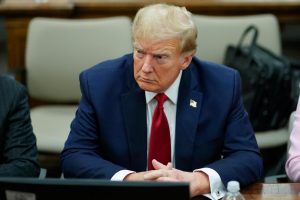
Smugglers are bringing migrants to a remote Arizona border crossing, overwhelming US agents
LUKEVILLE, Ariz. — Gerston Miranda and his wife were among thousands of migrants recently arriving at this remote area on Arizona’s southern border with Mexico, squeezing into the United States through a gap in the wall and walking overnight about 14 miles (23 kilometers) with two school-aged daughters to surrender to Border Patrol agents.
“There is no security in my country,” said the 28-year-old from Ecuador, who lost work when his employer closed due to extortion by criminals. “Without security you cannot work. You cannot live.”
A shift in smuggling routes has brought an influx of migrants here from countries as diverse as Senegal, Bangladesh and China, prompting the Border Patrol to seek help from other federal agencies and drawing scrutiny to an issue critical in next year’s presidential elections.
With hundreds of migrants crossing daily in the area, the U.S. government on Monday indefinitely shut down the nearby international crossing between Lukeville, Arizona, and Sonoyta, Mexico, to free Customs and Border Protection officers assigned to the port of entry to help with transportation and other support. The agency also has partially closed a few other border ports of entry in recent months, including a pedestrian crossing in San Diego and a bridge in Eagle Pass, Texas.
Critics of the move, including Arizona Democratic Gov. Katie Hobbs; the state’s two U.S. senators, the governor of Mexico’s Sonora state and the leadership of the nearby Tohono O’odham Nation, said it could harm trade and tourism. Hobbs urged President Joe Biden to reassign the 243 National Guard members already in the Tucson sector to help reopen the Lukeville crossing.
The morning after it was closed, about a dozen Border Patrol agents in olive green uniforms watched over some 400 migrants who had spent the night by the towering wall of steel bollards, wrapped in shiny Mylar blankets they later discarded among saguaro cactus and Palo Verde trees.
The Lukeville area’s popularity as a place to cross the border from Mexico into the U.S. emerged in recent months. It’s one of the most striking examples of migrants shifting to a remote area, putting the Border Patrol on its heels.
Because Lukeville is so remote, Border Patrol staffing is light, so traffickers in the region controlled by Mexico’s Sinaloa cartel steer people there.
Chris Clem, a retired Yuma, Arizona, sector chief, said it is part of smugglers’ strategy to stretch agents as thinly as possible, forcing highway checkpoints to close and other resources to be diverted for processing migrants. The remoteness creates “enormous strain” on the Border Patrol, he said.
Art Del Cueto, a Tucson-based vice president with the National Border Patrol Council, said the union wants stricter measures to deter migrants from coming. He said it’s not so much a matter of too few agents, but one of too many migrants.
Heading into next year’s presidential elections, the border is a top issue for voters, especially Republicans, and immigration issues could be a liability for Biden, a Democrat, as he runs for reelection.
A national AP-NORC poll conducted in November found about half of U.S. adults say increasing security at the U.S.-Mexico border should be a “high priority” for the federal government, with 3 in 10 calling it a “moderate priority.” Republicans were more likely than Democrats to call it a high priority.

